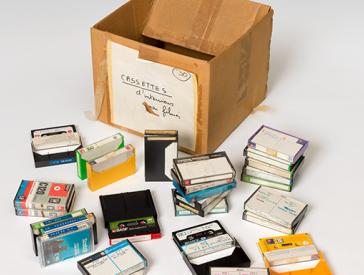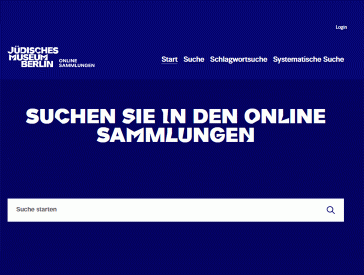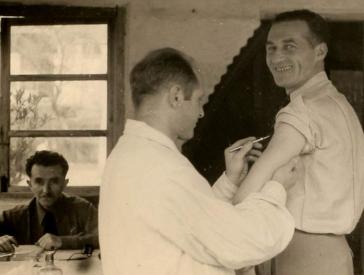Claude Lanzmann’s Audio Archive
Projects to Catalog, Preserve, and Share the Legacy of This Valuable Collection at the Jewish Museum Berlin
The Association Claude et Felix Lanzmann (A.C.F.L.), represented by Dominique Lanzmann, widow of the French journalist and documentary filmmaker Claude Lanzmann (1925–2018), donated a collection of 152 magnetic audio cassette tapes from her late husband’s estate to the Jewish Museum Berlin in 2021 and 2022. These previously unknown research recordings date from the period before the filming of Lanzmann’s monumental film Shoah.
Together with the film itself, the Lanzmann Audio Archive was added to the UNESCO Memory of the World Register on 18 May 2023.
These holdings are part of the Jewish Museum Berlin’s Audiovisual Media Collection.
The Cassette Tapes
The recordings – over 220 hours of audio in total – document a diverse range of conversations conducted by Claude Lanzmann and his assistants Corinna Coulmas and Irena Steinfeldt-Levy during their years of research in the 1970s. Beyond offering a view behind the scenes of the documentary, they also constitute a poignant collection of non-standardized interviews with surviving eyewitnesses to ghettos, concentration camps, and death camps as well as perpetrators, historians, international observers, and political figures. Lanzmann and his team traveled to Israel, the United States, Switzerland, East and West Germany, Austria, the United Kingdom, and Poland, seeking out people and places that could help them understand the history of the Shoah.
These conversations with survivors and numerous expert historians took place in comfortable settings such as restaurants and the interviewees’ homes. The conversations were conducted in German, English, French, Polish, Yiddish, Hebrew, and Italian, often with simultaneous translation in multiple languages.
When it came to perpetrators, Lanzmann and his assistants frequently showed up unannounced and used hidden tape recorders. If allowed inside, they would often find themselves drinking coffee and smoking cigarettes in the living rooms of former Nazi henchmen.
The recordings reflect spontaneous exchanges, improvised conditions, and the quest for answers, clues, and people willing to talk.
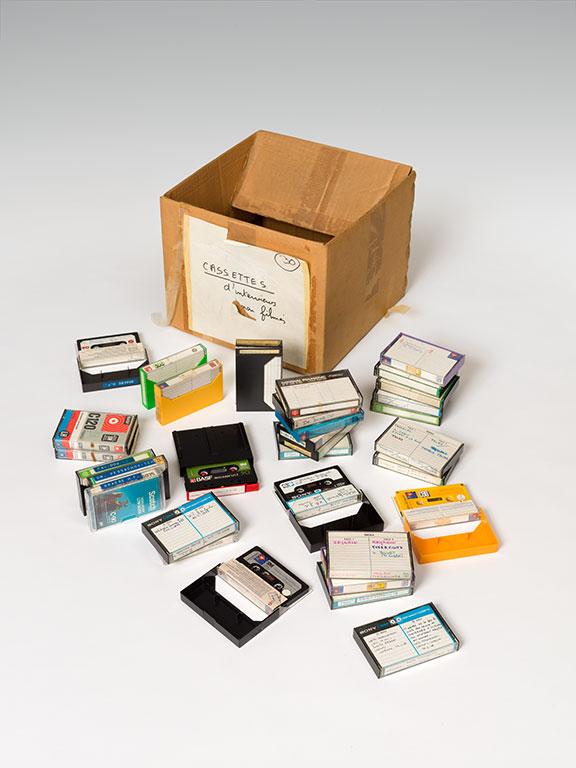 X
X
Magnetic audio cassette tapes from Claude Lanzmann’s Audio Archive; Jewish Museum Berlin, photo: Roman März
![Teils beschädigter Zettel mit der handschriftlichen französischen Beschriftung „Cassettes d’interviews [de mon?] filmes“ (Kassetten mit Interviews [meines?] Films](/sites/default/files/styles/large/public/media/images/lanzmann-label-kassettenbox.jpg?itok=H-cAVFIW)
Research audio recordings for the film Shoah with Jacob and Pauline Werbin, San Francisco, ca. 1976; Jewish Museum Berlin, accession 2021/153/110, gift of the Association Claude et Felix Lanzmann
Transcription
Speaker 1: <sim Don’t you> think it’s a little bit late in the game to make a docume_ a documentary <sim right now?>
Speaker 2: <sim Well, listen_ >
Speaker 1: <sim After so many years?>
Speaker 2: I make a very special kind of documentary. It is a_ I don’t try to revive the things as they were, as this is impossible.
Speaker 1: Yeah.
Speaker 2: But what I make, it’s an inquiry about the Holocaust, which is carried on today, you know. It is a film about memory and about time and, <sim maybe it’s_>
Speaker 1: <sim In other words,> you make it in chapters.
Speaker 2: Yes.
Speaker 1: You start out from <sim the all time.>
Speaker 2: <sim Exactly.> But I start from now on.
Speaker 1: You start from now what the people are doing now.
Speaker 2: Exactly.
Speaker 1: And you go backwards <sim how_>
Speaker 2: <sim We dive in the past.>
Speaker 1: Yeah. How they came to that <? position> right now.
Speaker 2: Yes, exactly. And there are many people in the film. Many people.<p2> And, uh, maybe it’s late. I agree with you. It’s late, <sim but_ >
Speaker 3: <sim It’s never late.>
Speaker 2: It was <sim never_>
Speaker 3: <sim People> are still reading history from two, 3000 years ago <sim that was_>
Speaker 2: But it was never done before. And if we don’t do it now, in ten years, it’s too late. Because the people will be_ you know that many witnesses are dead already? Many, many.
Speaker 1: Do you think you can make a success out of it?
Speaker 2: Well, this is not the purpose. We don’t do it as a commercial venture. This film was asked to me by the Israeli government.
Speaker 3: <sim Yeah, but> the <Yad Vashem>.
Speaker 2: But the Israeli state and Yad Vashem.
Cataloguing the Collection for Scholarly Use
Since April 2024, we have been working to make the Lanzmann Audio Archive accessible to researchers and the general public. All audio recordings are being transcribed and translated into German and English. We are also investigating the context of the recordings: Who is speaking? What occurrences and historical events do the speakers discuss, and what geographical locations do they mention? By the end of 2027, the entire Lanzmann Audio Archive, along with supplementary materials, will be available to explore on the online platform Oral-History.Digital (OH.D).
Archiving and Dissemination of the Audio Collection
In addition to the cataloguing process, conserving this special collection and sharing it with the public are among the Jewish Museum Berlin’s top priorities. To mark Claude Lanzmann’s 100th birthday on 27 November 2025, we will be opening the exhibition Claude Lanzmann: The Recordings, which will present the recordings to the public for the first time. Even after the exhibition concludes, the collection will remain visible and accessible through our digital programs for students and adults.
Contact
Dr. Tamar Lewinsky
Point of contact for the overall project and
Curator of Audiovisual Media
T +49 (0)30 259 93 458
t.lewinsky@jmberlin.de
Dr. Sonja Knopp
Point of contact for the scholarly publication and
Project Coordinator
T +49 (0)30 259 93 310
s.knopp@jmberlin.de
Project Duration
1 April 2024 to 31 December 2027
Supported by
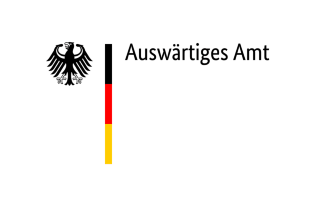
Use Cases: The JMB’s Digitized Collections (3)



